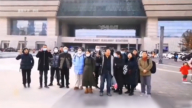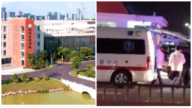【新唐人2015年01月31日訊】《紐約時報》28號報導,根據外國在華科技公司獲得的一份文件拷貝,中共當局採納了一個新規定,要求向中資銀行出售電腦設備的公司交出秘密源代碼,服從侵入性審計,並且在軟硬件上面建立所謂的「後門」以便當局監視。
根據《紐約時報》的引述,針對銀行業網絡安全的新規定中表示,對於大多數電腦和網絡設備,源代碼必須交給中共官員。
不過,文章提到,許多外國公司不願意披露代碼,因為擔憂知識產權、安全問題,甚至可能觸及美國出口法律。
動態網總裁比爾·夏:「軟件的話,有些保密措施,就把它鎖上,源代碼是鎖的結構和鑰匙。這些技術細節就都洩露出去了,保密的信息中共也都可以看到了。」
新規定還呼籲想向中資銀行銷售產品的公司,在中國設立研發中心,並建立「端口」,允許中共官員來管理和監督其硬件的數據處理。新規定中說,到2019年,銀行和金融機構要確保至少75%的計算機系統,使用「安全和可控制的」技術。
《紐約時報》說,當局在去年年底批准了這份長達22頁的新規定,而隨著北京聲稱要進一步加強對關鍵產業的網絡安全管理,在接下來的一個月裡,外國科技公司可能還會面臨一系列這樣的條規政策。
中共伸手要源代碼,將西方科技企業置於兩難。如果將源代碼交給中共當局,除了對核心技術保密的考量,在商業方面,使用同樣源代碼的程序和軟件,也將無法出售給美國或其他國家的銀行系統。而如果不交出源代碼,將難以進入龐大的中國市場。
儘管多個外國企業團體已經在週三,寫信給習近平任組長的「中央網路安全和信息化領導小組」,反對新的規定,抱怨其等同保護主義。不過,在當局的「在核心領域棄用國外科技產品」計劃下,這也許只是第一步。
根據《彭博社》去年年底透露,中共計劃在2020年之前,讓銀行、軍事機構、國企和核心政府機構,放棄使用國外公司的產品,轉而使用中國廠商的技術。去年底已經在吉林省四平市,完成了一輪科技產品國產化測試。在前期測試中,工作人員用「中標麒麟」替代了微軟Windows,用「浪潮服務器」替代了IBM服務器。
而對中國國內的民眾來說,這可能意味著「外面的網絡」更遙遠,「家裏的網絡」更不自由。
紐約哥倫比亞大學訪問學者谷川:「它最根本的目的就是為了控制網民、控制言論自由、控制網絡自由。但是它附帶會產生那些作用,一是貿易保護主義,二是國內那些科技公司的發展,讓這些公司佔領這些市場。」
紐約哥倫比亞大學訪問學者,網絡專家谷川舉例,就像Google,因為不配合中共的網絡審查,撤出了中國,之後中國市場就被百度佔領。
而中共在去年11月公布的《反恐怖主義法(草案)》,甚至更進一步,所有在中國境內的電信業務經營者,和互聯網服務提供商,將被要求為政府開通「後門」,將密碼方案提報主管部門審查,並且將相關設備、境內用戶數據留存在中國境內,否則就不得在境內提供服務。
正在大舉佔領中國智能手機市場的蘋果,無疑也將面臨這個問題,蘋果在iPhone 6使用新的加密方法,是基於每部手機獨特代碼的複雜運算。蘋果說,新機加密系統不設「後門」,所用密碼只有用戶自己才知道,即使法庭命令交出資料,公司也無能為力。但是中共有關反恐的新法律一旦通過,會要求蘋果提供一個鑰匙,以便中共可以解密iPhone上面存儲的數據。
採訪/易如 編輯/尚燕 後製/舒燦
Chinese Regime Asking For Source Code
Dilemma For Western Technology Companies
The New York Times has reported on the 28th that a copy of a
document obtained by foreign technology companies
has shown that the Chinese Communist Party (CCP)
had adopted a new regulation.
It requires companies that sell computer equipment to
Chinese banks to submit secret source code, obey the invasive
audits, build so-called “back doors" into hardware and
software to facilitate authority monitoring.
The New York Times has quoted, the new regulations which are
targeting the safety of the banking network, stated that the
source code of most computer and network equipment
must be handed over to CCP officials.
However, the report mentioned that, due to concerns about
intellectual property rights, security issues and breaching
US export laws, many foreign companies are unwilling to
disclose the code.
CEO of Dynamic Internet Technology, Bill Xia: There are
some security measures in the software to lock it,
the source code is the lock’s structure and key.
If these technical details have leaked out, then CCP can see
the confidential information.
The new regulations also called for companies that want to
sell to Chinese banks to establish research and development
centres in China, and build “ports" allowing CCP officials to
manage and monitor their hardware’s data processing.
The New York Times reported, this 22-pages long new rules and
regulations was approved by the authorities at the end
of last year.
With Beijing claims to further strengthen the management
of network security in key industries, foreign technology
companies may face a series of such regulatory policies
in the coming months.
CCP requirements for submitting source code has put
Western technology companies in a dilemma.
If they hand over the source code to the CCP, in addition to
concerns about core technological secrets, they also cannot
sell programs and software using the same source code
to US or other countries’ banking system.
If they do not hand over the source code, it will be very
difficult for them to enter the huge Chinese market.
Multiple foreign business groups has sent a letter to the
Central Leading Group for Internet Security and Information
led by Xi Jinping, to object to the new regulations and
complain it is equivalent to protectionism.
However, under CCPs plan of “Abandoning foreign technical
products in core areas", may just be the first step.
Bloomberg revealed at the end of last year, CCP plans to
make banks, military institutions, state-owned enterprises
and government agencies to turn away from foreign
company’s products to Chinese products before 2020.
A round of testing domestic technology products has been
completed late last year in Siping City, Jilin Province.
In the early stages of the test, staff members replaced
Microsoft Windows with “Kylin OS", and replaced their
IBM server with “Inspur server".
For Chinese people, this may mean the “external network"
is even more distant, and the “domestic network"
has even less freedom.
Visiting scholar at Columbia University, New York, Tanigawa:
Its fundamental purpose is to control netizens, freedom of
speech, and Internet freedom.
But it has some side effects, one is trade protectionism, the
other is allowing the domestic technology companies to
develop and occupy the market.
Tanigawa, who is also a network specialist, gives the example
of Google, which withdrew from China because it did not
cooperate with the CCPs Internet censorship, and the Chinese
market was then occupied by Baidu.
The draft of the “Anti-Terrorism Act" which was announced by
the CCP in Nov. last year even stated all telecom operators
and Internet service providers in China would be asked to
open back doors for the government.
They must submit their password schemes to the department
for examination, and leave the related equipment and user data
in China, otherwise may not provide services in China.
Apple, which is currently occupying China’s smart phone market
will undoubtedly face this problem.
Apple uses a new encryption method in the iPhone 6, which is
based on complex calculations of each phone’s unique code.
Apple has stated that there is no “back door" in the new
encryption system, only users themselves know their own
password, so even if the court orders Apple to hand over
the information, the company cannot do anything.
However, if the CCPs new anti-terrorism laws are adopted,
it will require Apple to provide a key to the CCP so it
can decrypt the data stored on the iPhone.
Interview/YiRu Edit/ShangYan Post-Production/ShuCan






























